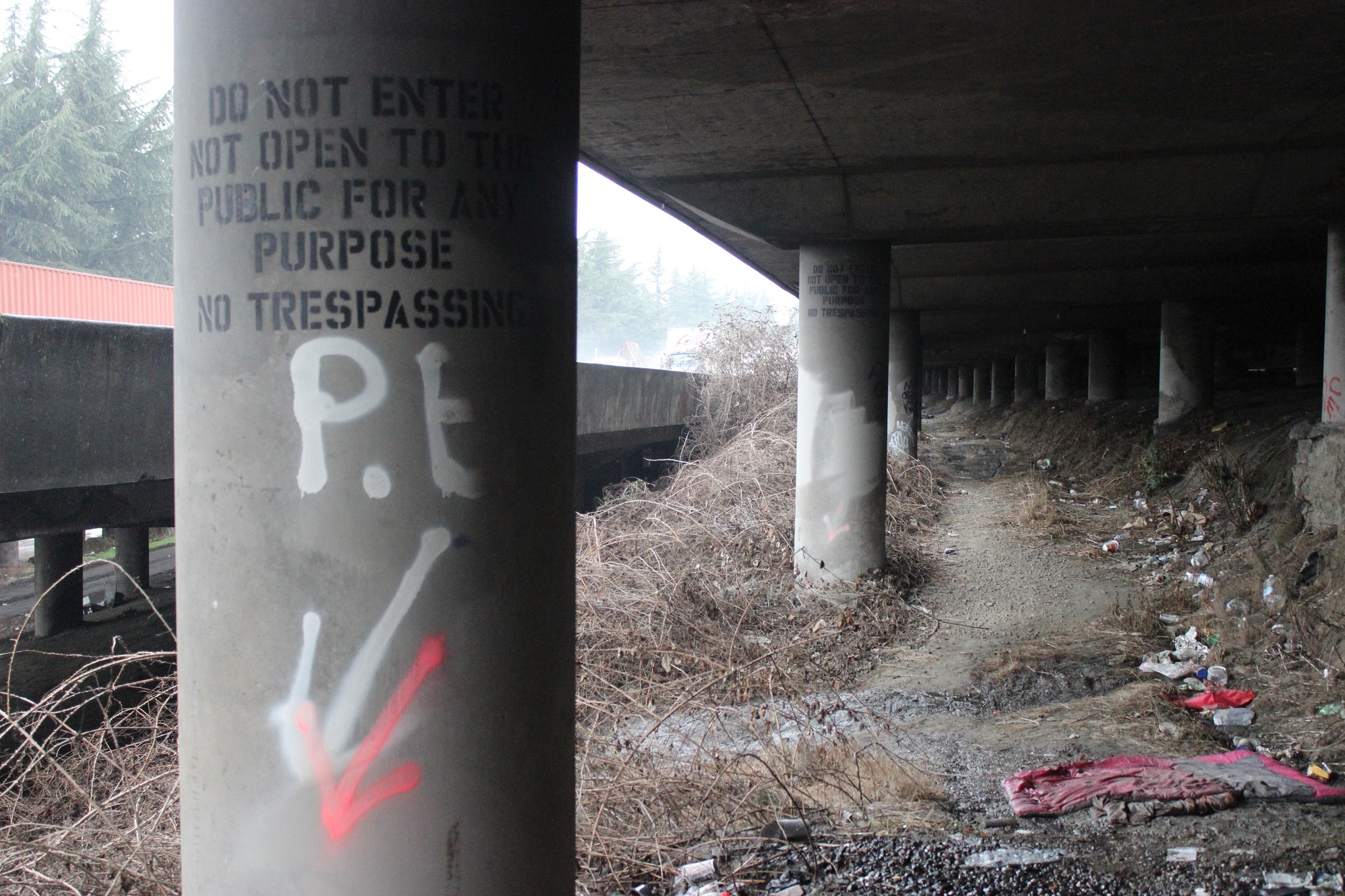Last week, Sally Bagshaw and Mayor Ed Murray were staging dueling press conferences in a tightly contested game of spin with the media over what Seattle should do with the Jungle. This week, Bagshaw has gotten the mayor to sign on to a council resolution that indefinitely delays his plan to clear all campers out of the archipelago of unpermitted homeless encampments along I-5.
Resolution 31671, passed unanimously yesterday afternoon by the Seattle City Council, does three important things. First, it beefs up the requirements for what counts as a “meaningful” offer of shelter—Bagshaw often voices her belief that “11 hour shelters” that kick guests out in the morning don’t qualify. Second, it requires that before anyone can be evicted from the Jungle, the Murray’s office must brief the council on exactly what kind of shelter and services were offered to and refused by campers. And third, it promises to bring garbage services and needle disposal bins in the Jungle for use by residents.
It remains to be seen whether the city and its outreach partner Union Gospel Mission will be able to deliver meaningful offers of housing or shelter. As we’ve reported previously, local emergency homeless shelters are regularly filled to or near capacity, and Seattle’s larger housing affordability crisis complicates efforts to produce the housing in the well-worn policy slogan “Housing First.”
The present situation is quite a contrast against how things stood just a week or two ago. Last week, Murray sought to portray the council as delaying humanitarian aid to the Jungle. Bagshaw and her council colleague Mike O’Brien shot back, arguing (as this paper has) that clearing the Jungle without having sustainable shelter or housing lined up amounts to homeless whack-a-mole. In the following days, Bagshaw martialed her nuclear-grade pleasantness to rope the mayor into agreeing to an edited, but basically intact, version of her resolution. Detente.
Bagshaw’s final draft differs from her first draft in interesting ways. For instance, language in the original pointing out the insufficiency of Seattle homeless shelter was removed; language about the need for a coordinated regional response to homelessness was added. Also gone in the final draft is any mention of the word “sweeps”—a word that Murray objected to last week, saying he preferred the term “trying to save lives.”
While the resolution passed unanimously, not everyone was thrilled with it. Councilmembers Lisa Herbold, Mike O’Brien, and Kshama Sawant each spoke in favor of delaying the vote for a week so that groups like the ACLU-WA and Columbia Legal Services could weigh in. Herbold says she wasn’t able to share a copy of Bagshaw’s resolution with those experts until noon—two hours before the beginning of the meeting in which she would vote. In a hasty email to Herborld, Ann LoGerfo of Columbia Legal wrote that her “main, over-arching concern is that if what is being offered is temporary shelter with limited access, many of the individuals will ultimately opt for camping in public spaces. Having spoken to numerous Greenbelt residents, shelters do not promote stability and are viewed as just as dangerous as sleeping in public spaces.” Patricia Sully of the Public Defender Association criticized the resolution as lacking enforcement mechanisms and for using vague language that could be interpreted so as to allow sweeps. The resolution’s promise that “people are not to be arrested simply for being homeless,” Sully added in her email to Herbold, “is a red herring. No one is arrested for simply being homeless. They are arrested for trespass.”
During the discussion before yesterday’s vote, Bagshaw sought to assuage these fears, though comments by other councilmembers made it clear that a majority were ready to vote that day. “I want to make sure we’re all together on this,” she told her colleagues, saying that they could come back to tweak Jungle policy as time goes on. “Resolutions can be changed,” she said.
Seeing that they could not hold the vote for a week, Sawant, Herbold, and O’Brien ultimately voted in favor of the resolution. “I think some of the dance,” said Herbold afterward, “is when you’re up there talking about what your concerns are is to hear that those concerns are appreciated [by Bagshaw] and there are commitments to address them.”
Going forward, Bagshaw proposed, Jungle policy can go through a new public safety/public health committee headed by Bagshaw and M. Lorena González, who chair the council’s regular public health and public safety committees, respectively.
CORRECTION: An earlier version of this story mistakenly claimed that Herbold didn’t see Bagshaw’s resolution until noon on the day of the vote. In fact, Herbold says, she saw the resolution the day before, but was not able to share it publicly until noon on the day of the vote.








